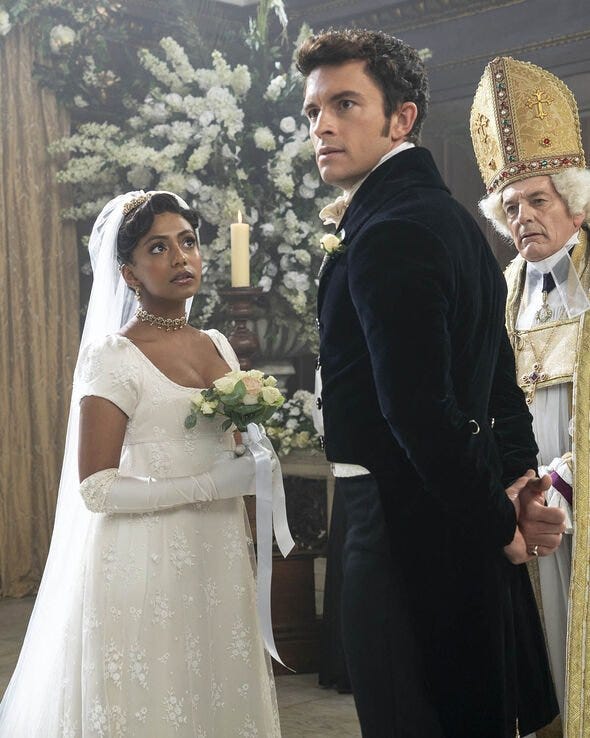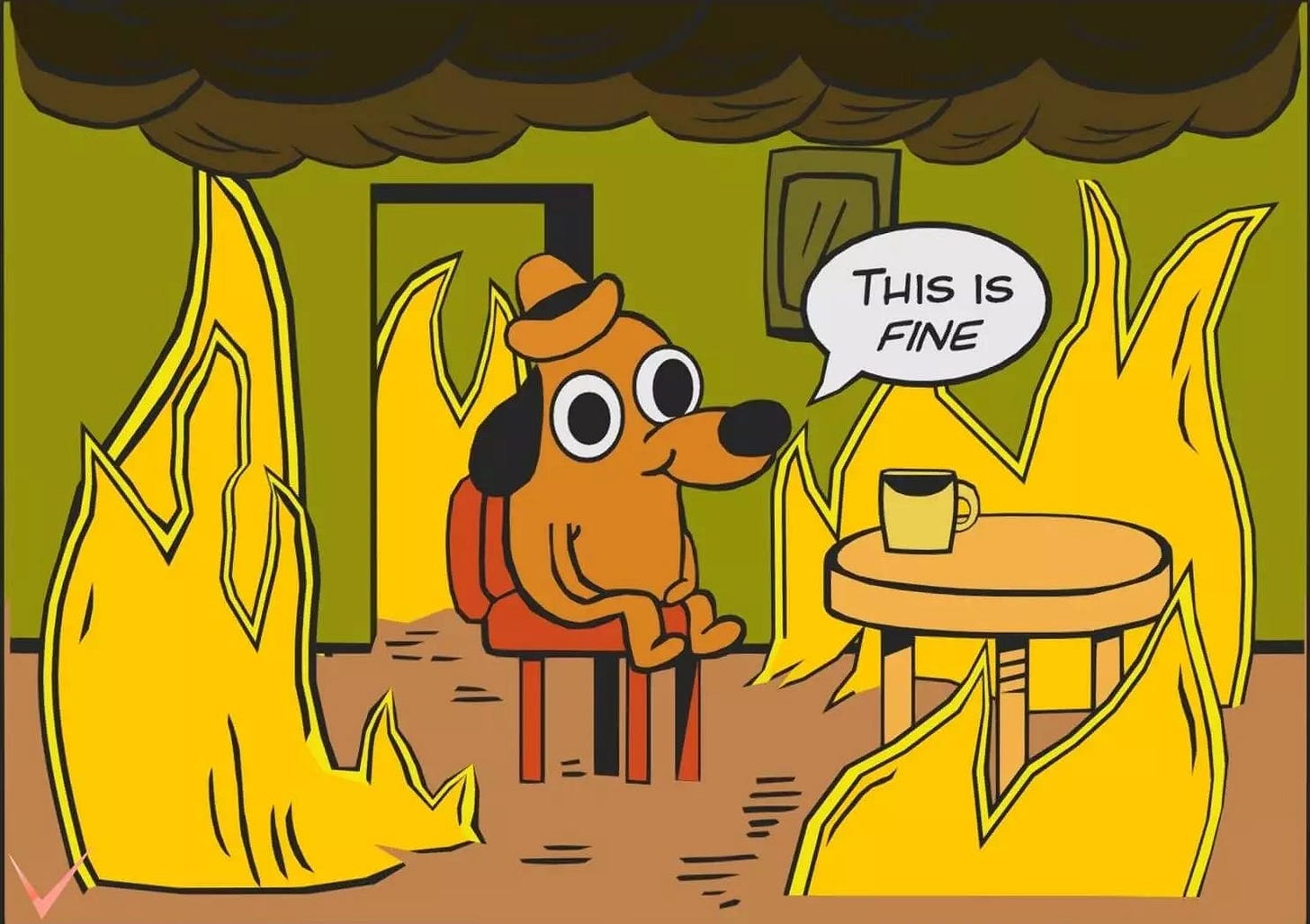Part One: To advance your career, unlearn this advice
Forget "Never burn bridges." I say "Go for (some) ashes."
This is a three-part series on career advice to unlearn. Read the next two parts here:
» Part Two: Forget “Do I need a mentor, a sponsor or a coach?” Go for guides.
» Part Three: Forget “executive presence.” Go for equanimity.
No one told me, a girl from Cleveland, Ohio, that getting married in Raleigh, North Carolina in July would be one of the worst wedding decisions ever. And, I mean, there were a lot of bad decisions: the lace I picked out for my gorgeous custom wedding gown (think Bridgerton Season 2 but even better) soon puckered around each flower and looked wrinkly on the day; the receiving line required guests to shake over a dozen wedding party people’s hands; we stood on a platform under bright spotlights for the toasts, making them feel like an eternity in hell; and I agreed to the garter toss (seriously, why is this a thing?!).

In preparation for this 400+ person party for mostly (to me) strangers, I cut images and tore glossy pages out of wedding magazines for months and added them to my planning binder. One such page had an image of a delicate, white beaded clutch and all the “Wedding Day Essentials” (think Jennifer Lopez to the rescue in the opening scene of The Wedding Planner). One such must-have were “blotting papers.” These wafer thin, small sheets allow ladies to gracefully pat away any oil or glisten that threatens to ruin carefully applied makeup. I purchased some right away and stowed them in my custom-made, matching satchel for the big day.
Ha! Raleigh in July? Throw me a beach towel, stat! It was sweltering. The air was thick and suffocating. It was the kind of miserable that is only relieved by jumping in a pool, the ocean, or an ice bath. No amount of fancy blotting papers could soak up the sweat. My makeup melted off within minutes.
By contrast, a good decision we made that day was to include an advice box on the entry table to the ballroom. (The best decision, of course, being who I married.) Guests wrote their marital advice on black cards in gold pen. We made a keepsake album of them after the wedding. The most common advice? You guessed it: “Never go to bed angry.”
After 23 years, I can unequivocally say, forget this advice. Instead . . .
Sleep. Don’t drag out a disagreement or fight for the sake of “Never go to bed angry.” Get some distance and perspective. Call a time out and sleep. Everything looks and feels different after a good night’s sleep.
The better advice is don’t start any crucial conversations—or deep discussions that may become crucial conversations—after 9 pm.
When it comes to our careers, we also look to others for advice. I’ve received some excellent, career-defining advice. Not all advice is good or actionable, though. And you don’t have to accept everything someone tells you just because it worked for them.
Here are the three things I’ve personally had to unlearn in my career:
Never burn bridges.
Find a mentor. No, a sponsor. Or maybe a coach.
Develop executive presence.
Forget “Never burn bridges.” Go for (some) ashes.
Let’s first distinguish between the act of burning bridges and other relationship endings.
Some things fall apart
I think to burn a bridge means there is either a one-sided or mutual “point of no return.” There’s no possibility of closeness that crossing to the other side would bring. Stated another way, if you saw the person in a public place again you would either 1) act like they weren’t even there or 2) reluctantly and briefly acknowledge them and get gone as soon as possible. You would never reach out to them for help and would not be inclined to help them in the future if they asked.
I say it can be one-sided because the other person may not realize you never intend to speak to them again. Most burned bridges aren’t the result of some big, fiery confrontation. Most are the result of actions that slowly chip away at trust and respect. (We just like our metaphors to be extreme and vivid!) Consequating behavior is never enjoyable. If you can set boundaries in an objective, dispassionate way, all the better for your longer-term mental health.
Relationships end in other ways, too.
There can be a natural decay over time and distance.
As you evolve and your vibration raises, those with lower vibrations tend to fade out of view.
People who just stop responding to your positive bids for connection (more on that here).
To put it in corporate lingo, there are regrettable and non-regrettable relationship endings. The career advice of “Don’t burn bridges” warns that you’ll regret it if you do.
I say “Go for (some) ashes.”
When to burn bridges
In a recent article on this very topic, Mita Mallick said she never burned bridges.
“Because for all of my career, I had been taught and trained to do otherwise. Stay professional, take the high road, don’t say anything that could be perceived as slightly negative or ruin relationships. Because we don’t want to be labeled as a troublemaker, a pot stirrer, or acting like a spoiled toddler who didn’t get their way. So, I understood that whatever you do, you never burn that bridge.” fastcompany.com
Mallick goes on to talk about three situations where it may be appropriate to burn bridges:
unethical behavior
actions that negatively impact you
actions that negatively impact others
Why I’ve burned bridges
Here are a few examples from my career. Be thinking about your own, though, as your jaw drops to the floor. Some of these are pretty unbelievable.
A contractor gig in a soul-sucking, windowless office I quit without giving notice.
An executive who didn’t take my sexual harassment complaints seriously and told me I was just “throwing my male co-workers under the bus” and I should work harder to get along with them. (This is some of the most egregious corporate gaslighting done to women.)
A former peer who sat down in our first intro 1:1 with a presentation titled “About Me” and proceeded to—no joke—talk about themselves for 45 minutes. Same person who told me after a few years of working together that they knew what my motivation was for why I made certain decisions: “You don’t actually want the job you currently have.” Really? Please, tell me more. No, wait, don’t. Don’t ever tell someone you know what their motivation is. If you want to know, ask. Otherwise, keep your opinions and your narcissistic slide decks to yourself.
A former boss who routinely fell asleep in our 1:1s. Yep, fell asleep while I was talking. What does one do when that happens? you might be wondering. I really don’t know. I just kept talking because it was pretty much the same whether I was talking to him awake or asleep.
And, finally, one of my favorites . . . A former boss who told me, “You haven’t even been here for 90 days; I can just fire you,” after I’d suffered a traumatic brain injury in a car- and weather-related incident. I had asked for six weeks to recover based on my neurologist’s assessment and treatment plan. I didn’t take time off and instead kept my job and the long-term effects of an under-treated TBI.
A variation of “Don’t burn bridges” is usually from a well-meaning leader peddling some version of, “You need to get along with this person [on my team, who treats you like shit or who generally doesn’t get along with anyone else] because I wouldn’t want you to get a reputation as someone who can’t play nice with others.” This tactic is so problematic on so many levels—and often gendered. Suffice it to say, don’t manipulate high-performing people trying their damnedest to do their job while also navigating assholery.
Sign me up for Pyromaniacs 101
So I have burned bridges along the way. And the examples above aren’t even the worst ones. But I no longer regret lighting the match. I wasted so much time earlier in my career dwelling on burnt bridges and second-guessing all the things I could have done to create a different relationship outcome. (People-pleaser much? Yup.)
You obviously want to be judicious here but I can say, without hesitation, sometimes in order to set a healthy boundary, you need to burn that bridge. Or at least put a locked gate up on your side.
Go for (some) ashes
Burning bridges should always be a last resort. Before going there, make sure you
assume good intent from others
speak up when needed (including involving your leader or HR)
give direct feedback
do your best to make it work
The fallacy I want everyone, especially women, to unlearn is: I am responsible for continually being “all good” with someone who repeatedly treats me badly. You do not. There are so many amazing people that you can network with for your next job. Focus on being one of those amazing people yourself and let the rest go.
Finally, let’s push this metaphor even further, shall we? Assuming you have burned a wood bridge . . .
“. . . since ashes do not contain nitrogen and will not burn plants, they can be useful in the garden, especially in the compost pile.” gardeningknowhow.com
So go ahead and spread the ashes of your burnt bridges in your career garden! I promise new relationships will flourish in place of the old and toxic that go up in flames. 🔥
This is a three-part series on career advice to unlearn. Read the next two parts here:
» Part Two: Forget “Do I need a mentor, a sponsor or a coach?” Go for guides.
» Part Three: Forget “executive presence.” Go for equanimity.





